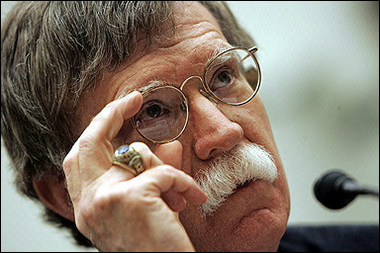|
US voices hope Japan can join UN Security Council
(AFP)
Updated: 2005-11-11 09:14
United States Ambassador to the UN John Bolton voiced hope that Japan would
be granted a permanent seat on the UN Security Council "at the earliest possible
opportunity."
Addressing a General Assembly debate on Security Council reform, Bolton
restated Washington's long-standing support for Japan's admission to the
powerful 15-member United Nations body and opposition to a larger expansion.
Japan, a close ally of Washington, is the second largest contributor to the
UN budget after the United States.
"We hope very much that Japan will be able to take a permanent seat at the
earliest possible opportunity," Bolton said.
But he reiterated Washington's opposition to a joint bid by Japan, Brazil,
Germany and India to secure permanent membership on the council.

United States
Ambassador to the UN John Bolton, pictured September 2005, voiced hope
that Japan would be granted a permanent seat on the UN Security Council
'at the earliest possible
opportunity.'[AFP/File] | A bid by Japan and its
partners in the so-called G4 group -- Brazil, Germany and India -- to secure
permanent Council membership stalled earlier this year in the face of US and
Chinese opposition and insufficient backing from the 53-member African Union.
China, the only Asian nation with a permanent council seat, said Japan must
do more to show it regrets its militarist past.
The G4 plan introduced in the General Assembly would boost council membership
to 25, with six new permanent non-veto-wielding seats -- one for each of the
so-called G4 members and two for Africa -- and four non-permanent seats.
Bolton conceded that developing countries deserve greater representation on
the council.
But he stressed that qualified candidates should meet criteria on the size of
economy and population, military capacity, contribution to peacekeeping
operations, financial contributions to the UN, commitment to democray and human
rights, non-proliferation and counter-terrorism records and equitable geographic
balance.
"Those member states who most clearly meet those criteria should be allowed
to serve on the council, even when there is a disagreement over other
candidates," Bolton said.
"The United States is prepared to engage in an effort to find a proposal that
allows for agreement on expansion of the council," he added. "However, too large
an expansion would risk making it unable to quickly address challenges to
international peace and security."
Any of the five current permanent members -- Britain, China, France, Russia
and the United States -- could veto the proposals being considered by the UN
General Assembly to expand the council.
Bolton made it clear that two other proposals for council expansion were
unacceptable to Washington.
One proposal by a group led by Canada, Pakistan and Italy calls for enlarging
the council from 15 to 25 seats with 10 new non-permanent members that would be
elected for two-year terms, with the possibility of immediate re-election.
Another presented by the African Union presses for a 26-member Security
Council, with six new permanent seats with veto power, including two for Africa,
and five non-permanent seats, including two for Africa.
|